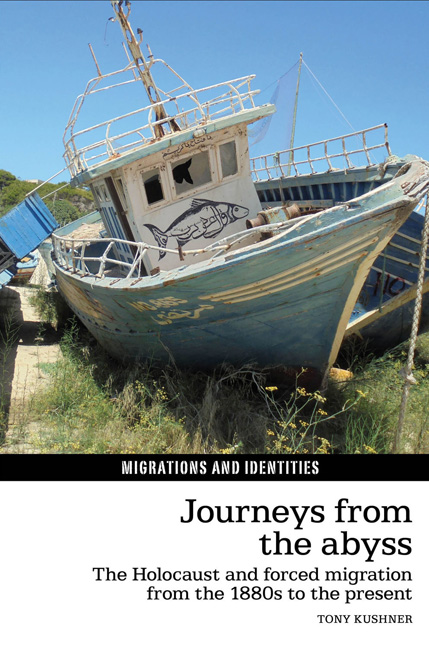Book contents
- Frontmatter
- Dedication
- Contents
- Preface and Acknowledgments
- Introduction: Migration and the Holocaust
- Part 1 Gender, Forced Migration, and Testimony: From ‘White Slavery’ to ‘Trafficking’ via Refugee Domestic Servants
- Part 2 Place, Performance, and Legality: Holocaust Survivors and Other Migrant Journeys in the Long Twentieth Century
- Conclusion
- Bibliography
- Index
Conclusion
- Frontmatter
- Dedication
- Contents
- Preface and Acknowledgments
- Introduction: Migration and the Holocaust
- Part 1 Gender, Forced Migration, and Testimony: From ‘White Slavery’ to ‘Trafficking’ via Refugee Domestic Servants
- Part 2 Place, Performance, and Legality: Holocaust Survivors and Other Migrant Journeys in the Long Twentieth Century
- Conclusion
- Bibliography
- Index
Summary
We know that the emigration of approximately 350,000 Jews from Germany and German-occupied Czechoslovakia before the war was forced …. The flight of the Belgian and Parisian Jews in 1940 and the evacuation of Soviet Jews a year later was compounded with the mass migration of non-Jews.
It seems that Raul Hilberg's reflections on Jewish emigration during the Nazi era connects it to wider movements of refugees, the numbers of which would not be exceeded until the twenty-first century. Yet rather than link Holocaust studies with migration studies, Hilberg (a Jewish refugee himself), was doing the reverse. His aim was to show what he believed was the particular and peculiar path of non-resistance followed by the Jews during the years of persecution. Indeed, Hilberg's chronological overview continued by emphasising Jewish passivity as the murderous assault intensified during the war:
We know that only a few thousand Jews escaped from the ghettos of Poland and Russia; that only a few hundred Jews hid out in the large cities of Berlin, Vienna and Warsaw; that only a handful of Jews escaped from camps.
Hilberg concludes ‘In the main, the Jews looked upon flight with a sense of futility. The great majority of those who did not escape early did not escape at all.’
Journeys from the Abyss has queried Hilberg's analysis at many different levels. It has done so not only in relation to the number and percentage of Jews who were able to flee but also with regard to the importance of their own agency. As Gunnar Paulsson notes in his remarkable reconstruction of wartime Warsaw and its hidden Jews, a space and time which he describes as a ‘secret city’, Hilberg ‘treats the reactions of the two million or so people who fled or went into hiding – surely the most reasonable and human of all responses to an overwhelming hostile force – briefly and dismissively’. Yet it remains that, in spite of previous and subsequent scholarship, Hilberg, described as ‘the seminal figure in modern Holocaust historiography’, set a model which has proved extremely durable. The enormity of the Holocaust has led to a tendency to place it outside of history and therefore beyond comparison.
- Type
- Chapter
- Information
- Journeys from the AbyssThe Holocaust and Forced Migration from the 1880s to the Present, pp. 305 - 314Publisher: Liverpool University PressPrint publication year: 2017



